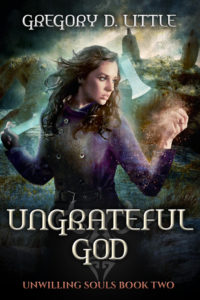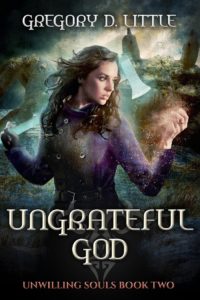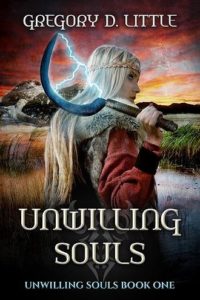 Me again! A bit earlier in the month, I spoke about one of my favorite authors, Daniel Abraham, and what I believe constitutes the “special sauce” that separates his writing from that of others.
Me again! A bit earlier in the month, I spoke about one of my favorite authors, Daniel Abraham, and what I believe constitutes the “special sauce” that separates his writing from that of others.
Now, I’ll be subjecting you, dear readers, to my analysis of my own writing. It tends to grow from seeds. I say “seeds” in the plural rather than the singular because I rarely begin a story with a single idea. A single interesting idea is generally not enough (for me at least) to build a story upon. I’ll file the idea away (writing it down if I’m smart) and wait until another, totally different idea, strikes me. If I find that this second idea is challenging–but not impossible–to merge with the earlier notion, a strange kind of resonance begins and my inspiration module kicks into gear. One thing builds upon another builds upon another and on and on they snowball.
That’s how two disconnected ideas:
- A race of beings imprisoned in a miniature replica of an entire world
- Cities built into the bones of mountain-sized monsters
merged to create the world of Unwilling Souls. These two ideas had, initially, nothing to do with one another. They wouldn’t hang together as-is, so they required tweaking.
Who was this race of imprisoned beings, and why had they been locked away? I decided that these were the gods, locked away in a human-built prison after a failed attempt to exterminate humankind. And the prison itself, rather than simply being a replica of the outside world stored in some fantasy version of the Indiana Jones warehouse, was in fact carved into the very core of the outer world. Prisons require jailers, who require a place to live. The center of a planet is not terribly comfortable and is rather full, so I envisioned a hollowed-out space surrounding the prison-core itself, the magma of the mantle held in check by magic of immense power. In this hollow space, the jailers would live and work, protecting the surface world above from the gods that had sought to destroy them. These jailers would be blacksmiths of a sort, for since the core of an Earthlike planet is made of metal, metalworkers would be needed to maintain this prison of the gods.
So where do the giant beast-bones come in, and why do people live in them rather than building normal cities? Well there were normal cities, it turns out, before the gods began their war against humankind. But in the last gasps of that war, as they realized they were going to lose, the gods summoned up great beasts of truly mind-boggling size (for a real-world comparison, these would laugh at kaiju, chowing down easily on any iteration of Godzilla you can think of). These beasts went on to all remaining cities as well as most of the world before humankind rallied and killed them in turn. Then, having little else to base rebuilding their civilization, they turned to the bones of these beasts and used them as foundations for their new homes. Being magical in nature, the bodies lingered on well past when they otherwise would have. They also retained some other … interesting properties.
So there we have it. A setting chock-full of weirdness that nonetheless hangs together coherently. Or at least, my definition of coherently. What? And incidentally, I’ll be hosting the blog in July for an entire MONTH of good stuff about setting, so stay tuned!
But setting is only part of a story, and worldbuilding alone is not enough. It’s characters that drive a story, after all. And in a world this strange, I wanted characters who were grounded in believable (if larger-than-life) behaviors and personalities. The first story I conceived of for this world was a short story (serving as a prequel to the novels) based a little on one of the oldest there is: Romeo and Juliet, the star-crossed lovers. Larimaine and Cassia mine were called. Because Larimaine’s ancestors had opposed the gods in the war and Cassia’s had joined with them, their relationship struggled to bridge an almost endless societal divide. (Also, Larimaine wasn’t nearly good enough for Cassia). They don’t work out, of course, being star-crossed and therefore tragic (but not, like, DEAD tragic) by nature.
I write this way, with pieces finding odd connections to other pieces, because I find great joy in it. An individual idea will rarely spark my interest enough grow into something lager. But as multiple ideas start crashing around together, they bring out nuances in one another they could never have achieved alone. Finding these connections, finding ways to make them all fit together like puzzle pieces from different sets merging to form a picture both impossible and utterly believable is what keeps pulling me back to the keyboard. I’ve always been fascinated with how the world works, with how pieces of science and society and behavior fit together.
Writing fantasy is, at its core, simply a way of determining how a world works. It’s a secret sauce tasty to both myself and, so far at least, my readers!
About the Author: Gregory D. Little
Rocket scientist by day, fantasy and science fiction author by night, Gregory D. Little began his writing career in high school when he and his friend wrote Star Wars fanfic before it was cool, passing a notebook around between (all right, during) classes. His novels Unwilling Souls and Ungrateful God are available now from ebook retailers and trade paperback through Amazon.com. His short fiction can be found in The Colored Lens, A Game of Horns: A Red Unicorn Anthology, and Dragon Writers: An Anthology. He lives in Virginia with his wife and their yellow lab.
You can reach him at his website (www.gregorydlittle.com), his Twitter handle (@litgreg) or at his Author Page on Facebook.



